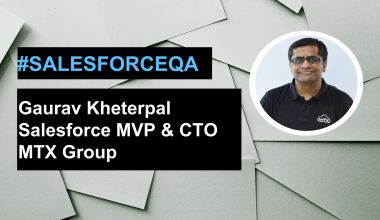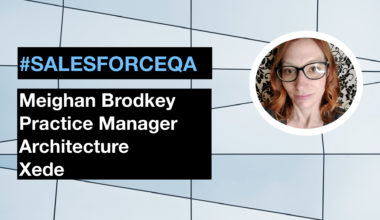In Third Republic’s Tech Leaders Q&A Series, we speak to industry leaders about the changing Salesforce ecosystem, and the impact that it is having in today’s digital world.
We caught up with Gemma Emmett, Founder at The Architech Club, who discussed how Salesforce is evolving in line with digital transformation, and how businesses and professionals can adapt and keep up with this growing ecosystem in order to be successful in this newly digital world.
Third Republic (TR): Hi Gemma, can you give us an overview of your background and your intro into Salesforce?
GE: I started working as an administrator ten years ago, looking after about 200 sales people and around 5-6 different admins around the world. I was responsible for making sure the system was maintained correctly, and I basically got really interested in it and enjoyed working with it because my background was in reporting and I was getting to pull from the system and look after it.
About 18 months later I got certified and was due to take a role in Guildford where I would have been an admin for an insurance company, but I got talked out of that and into taking on a customer-facing role and I decided to be a consultant and essentially help people implement Salesforce. Over the past few years my role evolved, and I upskilled quite a bit, so last year I moved into a solution architect role at Bluewolf.
TR: Looking back on all of that, if you could give yourself some advice when you first started your Salesforce journey, what would you say?
GE: Honestly, I would say you’re doing the right thing; at the time it felt like the right thing to do and I wouldn’t change it at all. However, my advice to myself – and to others – would be to not be afraid of raising challenges to people, and presenting challenges to the business, because you might just come up with a better solution by doing it.
TR: And how would you say the Salesforce world has changed in your time working in it then?
GE: In simple terms, the platform itself has changed in look and feel twice. But the world of Salesforce has changed in the sense that the learning resources have completely revolutionised – with the likes of Trailhead making it guided and gamified as opposed to professionals having to sift through technical documentation.
This has not only made it more accessible, but I also love that they have now placed the emphasis on themselves not as a software vendor, but as a company that sells software as a service and one that is trying to change perceptions and how people value each other.
Salesforce has never made a secret of valuing people and giving back to the community, but they have completely changed trajectory as of late and the focus has been on equality and this is now having a knock-on effect on businesses. So really, I’ve seen Salesforce disrupt both the business and technology worlds.
TR: As you noted, Salesforce is becoming known for championing equality and accessibility, why do you think this is?
GE: Because the ecosystem is growing all the time I think it really gives people the opportunity to learn and apply new skills and to remain relevant as a result.
There are so many different things you can do, and this won’t get any smaller so, whilst anyone doing a business or IT related degree has been trained for Salesforce perfectly, my best subjects were English, and Sociology, and I was still able to make a career in the ecosystem because it is just so accessible to everyone.
TR: What emerging trends are you most excited about, and why?
GE: I’m excited by Integration Cloud because that’s going to make things a lot easier, and it’s going to bring integration in-house so, from an architectural perspective, I think it will change the way we build systems and I’m definitely excited to learn more about that!
TR: And how do you see Salesforce fitting into the era of digitalisation and digital transformation?
GE: Salesforce fits in simply because it’s got so much capability to make a digital transformation successful. Businesses have to stop thinking about processes and think about their people and understanding how their actions affect their customers and employees.
The sooner businesses see that, and think about the emotions involved, they will realise that Salesforce is the best platform to support their digital transformation because you can design and build your own processes that fit these customer and employee needs. It’s such a flexible platform and I think it indicates a shift in mind-set from traditional systems that are designed around a database, whereas Salesforce is used to design around people.
TR: So, do you see Salesforce becoming key to helping businesses with their digital transformation drive?
GE: Yes and no. The reason I think no is because we’ve seen a lot of situations where someone will go to Dreamforce for instance, and they’ll see everything and buy into it and come back and want it then and there.
In reality the only vision that they have is a shiny new toy, as opposed to knowing what direction they want to take their business in and then harnessing Salesforce to do it. So there has to be a strategy if you want to get the best out of Salesforce for your transformation, and not just pick a bunch of new features you think will work.
TR: What are some of the key challenges that Salesforce professionals need to overcome in this increasingly digital world?
GE: With the growth of Salesforce, designing a solution just isn’t as easy as it used to be as you have to consider so many different options and, as an architect especially, all of the considerations are only getting bigger and bigger. As a result, professionals now have to ensure they are staying current and making sure that their qualifications and knowledge of best practise are up to date.
For instance, there are some things coming out now that are actually replacing old things, and the companies who were once early adopters are now the ones that are starting again and wanting to migrate to lighting. As a result, Salesforce professionals are faced with having a lot of old stuff to sift through, new requirements to build in and old requirements to chuck out, so it definitely presents a nice challenge – but a big one!
TR: In line with that, what advice would you have for professionals to ensure they can keep up in this ever-evolving ecosystem?
GE: Definitely get certified; once you’re certified you learn so much not only as you study but also as you practically apply what you have learnt. Get involved in trailhead, listen to webinars and join some community groups as a means to study and share ideas with.
And if you’re in a customer facing role make sure you get involved in a wide variety of projects and do some pre-sales work as this will enable you to go off and research other technologies and generally stretch your skills.
TR: So, to do well, you really do have to be dedicated to the ecosystem?
GE: You need to think about what you want to achieve and what your motivation is; I’ve been a super fan for so long and always loved Salesforce and wanted to get involved because I feel like I’ve got a new dimension to my life and have met people who are like minded and intelligent. People ask me how I have the time to do all this extra stuff, like my female architect’s community group, but I like to keep busy and stay involved so I don’t feel like it’s hard work.
TR: Speaking of your architects group, what was the motivation behind starting it?
GE: It started because I wanted to bring something to the community that would actually help and where people could actually do stuff. The existing community is just a message board, but once it became a group it slowly become more about bringing inspiration and evangelising the architect programme for woman and helping to build their confidence, so it has just grown organically from that.
TR: With all these changes in the ecosystem, do you perceive there to be a skills gap in the Salesforce world as a result of business need outweighing up to date skills?
GE: I think there’s a skills gap on the side of the employer sometimes; a lot of them think that having a really experienced Salesforce practitioner is the answer to their Salesforce problems, and it really isn’t.
There will still be stuff that Salesforce professionals don’t know because of the fact that the ecosystem is growing all the time, so employers need to have a change of mind-set and accept that their transformation with Salesforce is always going to be a working model because Salesforce is never finished.
As a result, businesses need to be more active in helping people to the experience and skills they need. Half the reason there is a skills gap at the moment is because businesses just aren’t entertaining newcomers to the job market – they believe you need an experience professional – but you can hire excellent database administrators and they can get up to speed quickly because SF is a big database in the sky!
If businesses focus on building the skills of their Salesforce employees, not just trying to hire the finished product, the skills gap could be closed quicker than it currently is.
TR: Do you therefore believe that those who are new to the industry – and coming in at a time when there are new technologies – have an advantage to those who have been working in Salesforce for longer and may have more outdated skills?
GE: I wouldn’t say that it’s an advantage, but it’s definitely not a disadvantage; someone who is new to the industry and is driven will invest a lot of their personal time in learning and have more current knowledge than experience members of the ecosystem.
However, if you’re in a customer facing environment and you have to put together a statement of work then having people around who don’t know Salesforce is a huge risk because you might not get everything delivered in the time it’s been sold, so you do definitely need an experienced person who has heard it and seen it all, and who knows what is possible, to help keep that speed going. So, both old and new comers have merit.
Plus, half the battle with delivering Salesforce is the fact that it is people based, so if you can navigate the complex land of customers changing minds or not mobilising their teams then it doesn’t matter how long you have been in the industry, as your technical knowledge will always grow.
TR: Based on that, do you think professionals now need different skills than previously in order to be successful?
GE: Soft skills are definitely important! That’s what I love about Trailhead – the fact there’s modules on skills like empowerment which are just as important as the technical skills. Being able to stand back and have gravitas and make customers listen to you makes much more of an impact than if you know everything technical, so I think that’s what you need to learn to be successful now.
TR: What other advice would you give to those wanting to profess on to become a Salesforce architect?
GE: You need to question things; as an admin lots of people will come with requests but you should never let your users come to you with just a solution. You should always delve deeper to understand the problem they are giving you because architects are always considering the pros and cons of various features, so getting experience doing this from the start will stand you in good stead for progressing.
TR: Finally – If it is difficult for businesses and professionals working in the ecosystem to keep up, how do you think those with outside knowledge of Salesforce – such as recruiters and internal resources – are handling the ever-shifting ecosystem, and how do you think this impact their ability to help fill the skills gap?
GE: I think recruiters now need to have the same level of commitment to the ecosystem as everyone else; the reason they’re consultants is because they match the solution to the problem and how can they do this if they don’t understand the problem?
Recruiters also need to be coming to user groups and using it as a chance to get to know somebody, because then they can sell them more effectively. People like Third Republic, who are turning up to events and getting to know the community by really being present in it, are the ones who are going to really help close the skills gap because they actually understand the ecosystem they’re working in, and who they’re working with.
Gemma Emmett is a Trailblazer who has been Salesforcing since 2008, starting out as an Admin and working her way up to her current role as a Solution Architect at Bluewolf. She’s also a wife, mother, and determined survivor of breast cancer. She’s earned over 200 badges on Trailhead, 15 certifications, and is currently working towards her Certified Technical Architect credential. Gemma founded the community group Ladies Be Architects, which aims to build confidence in women studying to be Salesforce Architects. Her dedication and commitment has earned her the coveted golden hoodie at Salesforce World Tour London.


